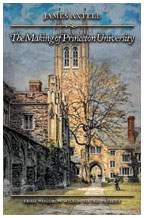June 7, 2006: Reading Room
Coming
of age in New Jersey
Historian James Axtell examines Princeton’s history
By Alex Barnett
In James Axtell’s book on Princeton’s history, the influence of Woodrow Wilson 1879 looms large. (Princeton University Press) |
Despite its name, Princeton University at the turn of the 20th century was a small liberal arts college that drew most of its students from East Coast prep schools and tended to hire its own graduates as faculty. The undergraduates — white, male, and overwhelmingly Protestant — were required to take seven classes each semester, but these didn’t interfere too much with the real business of the place: mass pilgrimages to the football field, the publication of The Daily Princetonian, and the all-important bicker.
 Yet
somehow, by the turn of the 21st century, the place F. Scott Fitzgerald
’17 once called “the pleasantest country club in America”
had been transformed into one of the world’s leading research universities,
a powerhouse in math and science, and a place where intellectual ability
largely had pushed aside the older standards of admission. How that happened,
among other things, is the topic of The Making of Princeton University:
From Woodrow Wilson to the Present, published by Princeton University
Press and written by historian James Axtell, a professor of humanities
at the College of William and Mary.
Yet
somehow, by the turn of the 21st century, the place F. Scott Fitzgerald
’17 once called “the pleasantest country club in America”
had been transformed into one of the world’s leading research universities,
a powerhouse in math and science, and a place where intellectual ability
largely had pushed aside the older standards of admission. How that happened,
among other things, is the topic of The Making of Princeton University:
From Woodrow Wilson to the Present, published by Princeton University
Press and written by historian James Axtell, a professor of humanities
at the College of William and Mary.
Woodrow Wilson 1879 looms large in Axtell’s story. Upon becoming University president in 1902, Wilson announced his ambition to make Princeton the best university in the country, and he pursued his vision energetically. Wilson organized the faculty into departments and brought order to the curriculum; he fired underperforming professors and hired academic stars away from other universities; he built up Princeton’s fledgling graduate school; and he raised academic standards and sought to make the undergraduates more intellectual.
An outsider — Axtell is a graduate of Yale and Cambridge — and an expert on the cultures of colonial North America, the author approached Princetonians, he writes, as he would “the cultural strangeness of the 17th-century Iroquois.” In four chapters devoted to undergraduate life, Axtell delves into dress, jargon, rituals, songs, games, politics, and religion to gain access to Princeton’s student culture. Other chapters follow the growth of the faculty, the graduate school, the library, and the art museum. To research the book, Axtell perused a century’s worth of back issues of student publications and PAW, consulted with current and former faculty and staff, and studied histories, memoirs, and novels relating to Princeton. He says a University policy prohibiting access to certain official records for up to 50 years after preparation had little effect on his work because the book’s focus was not on administration policies as much as their effects.
When asked the obvious question — Why Princeton? — Axtell
mentions a lifelong interest in the history of education, a fascination
with Woodrow Wilson, and the absence of any scholarly book on Princeton’s
impressive 20th-century history. “It’s a rare little tribe,
with distinctive colors and values and pride,” he says. “They’ve
got a lot going for them.” ![]()
Alex Barnett is a freelance writer and staff member at the University Art Museum.
BOOK SHORTS
 Freedom Riders: 1961 and the Struggle for Racial Justice —
Raymond Arsenault ’69 (Oxford). The author re-creates a pivotal
episode in the civil rights movement — when volunteers traveled
through the Deep South to enforce the integration of interstate buses.
Arsenault examines the riders’ experiences confronting hatred from
mobs of white supremacists. He is a professor of Southern history at the
University of South Florida, St. Petersburg.
Freedom Riders: 1961 and the Struggle for Racial Justice —
Raymond Arsenault ’69 (Oxford). The author re-creates a pivotal
episode in the civil rights movement — when volunteers traveled
through the Deep South to enforce the integration of interstate buses.
Arsenault examines the riders’ experiences confronting hatred from
mobs of white supremacists. He is a professor of Southern history at the
University of South Florida, St. Petersburg.
 Myths, Lies, and Downright Stupidity: Get Out the Shovel —
Why Everything You Know Is Wrong — John Stossel ’69 (Hyperion).
Based on Stossel’s segment on the ABC television program 20/20,
this book collects a range of popular beliefs and attempts to debunk them.
For example, he examines the “myths” that drug companies are
evil price gougers, outsourcing jobs overseas takes jobs from Americans,
and eating late at night makes you fat. Stossel is a consumer reporter.
Myths, Lies, and Downright Stupidity: Get Out the Shovel —
Why Everything You Know Is Wrong — John Stossel ’69 (Hyperion).
Based on Stossel’s segment on the ABC television program 20/20,
this book collects a range of popular beliefs and attempts to debunk them.
For example, he examines the “myths” that drug companies are
evil price gougers, outsourcing jobs overseas takes jobs from Americans,
and eating late at night makes you fat. Stossel is a consumer reporter.
 Something Happened: A Political and Cultural Overview of the Seventies
— Edward D. Berkowitz ’72 (Columbia University Press). The
author explores how the end of the postwar economic boom, Watergate, and
the defeat in Vietnam led to a more skeptical attitude toward the government;
the fight for greater legal recognition by women, gays, and the disabled;
and the rise of politically conservative religious organizations. Berkowitz
is a history professor at George Washington University.
Something Happened: A Political and Cultural Overview of the Seventies
— Edward D. Berkowitz ’72 (Columbia University Press). The
author explores how the end of the postwar economic boom, Watergate, and
the defeat in Vietnam led to a more skeptical attitude toward the government;
the fight for greater legal recognition by women, gays, and the disabled;
and the rise of politically conservative religious organizations. Berkowitz
is a history professor at George Washington University. ![]()
By K.F.G.
For a complete list of books received, click here.

